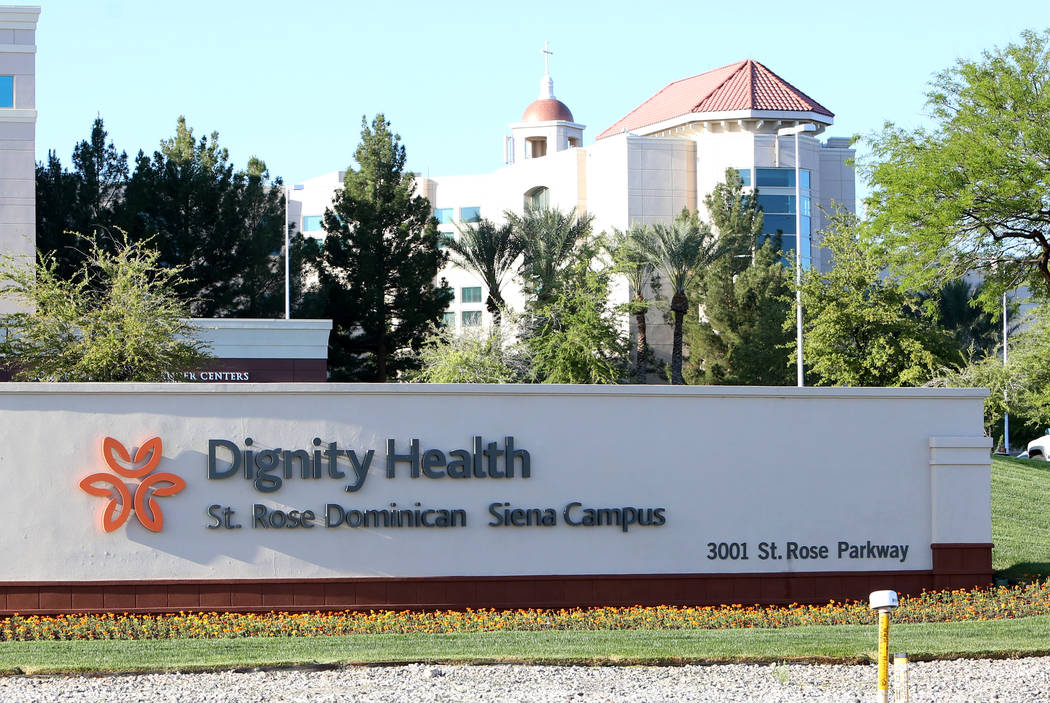Dignity Health now screens for anxiety in new mothers
Dignity Health — St. Rose Dominican Hospital’s Siena and Rose de Lima campuses are among the Las Vegas Valley locations where new mothers are now being screened for anxiety. Like postpartum depression, it can affect a new mother’s daily life.
Dignity Health formally began the program this year after partnering with the Southern Nevada Maternal and Child Health Coalition to ensure that Women, Infants, and Children (WIC) clinics screen new mothers for the condition. Those clinics can see 30-40 clients a day, said Kameron Klein, coordinator for the perinatal mood and anxiety disorders program.
“We see these moms come in for WIC care on a daily basis, so we see the gap,” she said. “As a new mom myself, I have a 9-month-old, going through that transition in my own life. …. So, I know there’s a need. It’s a huge transition (to have a baby).”
According to postpartum.net, depression affects 15 percent-20 percent of women who give birth, yet most are not diagnosed. Using conservative estimates, that equates to more than 600,000 women in America every year. Anxiety affects 10 percent of women under the same circumstances.
There is no definitive way to predict who will face anxiety after giving birth, but family history is one indicator. And if a woman had it with her first child, she’s likely to experience it with future children.
The transitional nature of Las Vegas, which many people move to with no family support system, can bring on anxiety, Klein said. Being a single with little or no income might also be a factor, she said.
Model Chrissy Teigen’s Glamour Magazine April article on postpartum depression helped bring the condition to the forefront, Klein said.
“She never thought anything like this could happen to her because she has all the money in the world and nannies and caretakers,” Klein said. “So, it doesn’t (hit) a specific type of person, or race or color, or education level.”
At the two Henderson Dignity Health hospitals, the average length of stay when giving birth is 1.72 days, said Jenn Cooper, with Dignity’s media department. An average of 5,048 babies are born annually at the hospitals, she said.
Anxiety can take days or weeks to manifest. With mothers being discharged sooner after giving birth unless they’ve a C-section, there is not always time for hospital staffers to witness anxiety kicking in.
“Most ladies want to get out of the hospital as soon as they can,” Cooper said. “So that’s why you need people who are outside of a hospital setting — a lactation consultant, pediatrician or a WIC specialist — to interface with these people beyond the hospital setting.”
Symptoms including being nervous or worried about the baby all the time, sometimes to the point that the mother won’t leave her home.
“They think they can take care of it by taking a walk of something, but it doesn’t go away,” Klein said.
A set of questions helps health care workers assess whether the mother is having issues: Are you feeling sad? Is it difficult to enjoy yourself? Are you irritable or tense? Do you feel anxious or panicky? Are you having difficulty bonding with your baby?
Family members may be asked similar questions about what they’ve noticed with the new mother, said Jacqueline Kennedy, who runs the Nevada Statewide Maternal and Child Health Coalition.
Young fathers can also experience depression after their significant other gives birth.
“That’s part of our training as well, that dads can get it,” Kennedy said. “So, it’s a new lifestyle; everything changes. And if their wife is experiencing anxiety, (the dads) don’t know how to help or what to say. They’re not getting much sleep, either.”
She said there’s added pressure of being the “man of the house, who’s supposed to be the strong one.”
There are mommy mixers where women can talk to a therapist and prescription drugs.
“But we always ask them to contact their physician,” Kennedy said.
“We want you to know that you are not alone,” Klein said. “We want you to get better. So, we’re trying to get the word out that this happens to women and their families more often than you might (think.)”
Contact Jan Hogan at jhogan@reviewjournal.com or 702-387-2949.
Anxiety
Roughly 6 percent of pregnant women and 10 percent of postpartum women develop anxiety, either by itself or in addition to depression. Common symptoms of anxiety during pregnancy or after delivery include:
Racing thoughts
Constant worry
Sleep disturbances
Lack of appetite
A gut feeling that that something bad will happen
An inability to sit still
Dizziness
Nausea






















